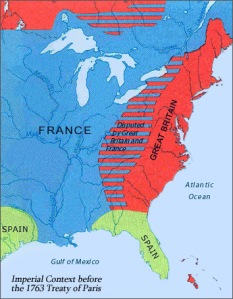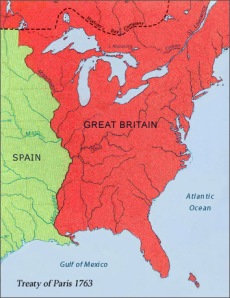Here is a link that provides access to an online version of the treaty; http://avalon.law.yale.edu/18th_century/paris763.asp.
Historical Significance
How notable was the event at the time it was happening?
The event was notable at the time because it ended the 7 Years War and led to a change in power.
How widespread and lasting were the consequences after the event?
When the treaty was signed, the war was brought to an end and the British were in control of all of the territory in “Canada” at the time. As a result, Canadian society today is partly influenced by British culture. The treaty also resulted in Britain creating the Royal Proclamation that still is part of the Canadian constitution today, and the Quebec Act in which the King essentially recognized Quebec as a “distinct” society and allowed French subjects to possess rights, which has created conflict regarding Quebec’s sovereignty.
Has the event become symbolic or representative of key historical issues or trends?
The event symbolizes an agreement of peace and the success of Britain in gaining control of Canada.
Evidence and Interpretation
The Primary source used is the Treaty of Paris, 1763. The treaty provides the exact conditions and terms that the French and the British ended the 7 Years War on. The Treaty indicates an attempt on the part of the French to create a bond of friendship and peace with Britain through the surrendering of land and citizens, and the renewing of old bonds and treaties in order to prevent future wars from occurring between the two nations. The treaty was clearly used as a means of peaceful negotiations and remedies.
Continuity and Change
Continuity:
- The French continued to live in Quebec
Change:
- British had total control over Canada
- French Territory was lost
- The French became British citizens and were given rights
The changes caused by the Treaty of Paris were positive because peace was created and the war between the French and the British in North America ended. As a result of of the treaty, France no longer occupied territory in North America, and Britain no longer occupies or controls Canada today thus making Canada a sovereign nation.
The changes that occurred happened in just over 200 years. The treaty, created in 1763, relinquished all french territory to Britain, and Britain had complete power over Canada. The Canadian constitution was an act of the British parliament (BNA Act) up until 1982, when Pierre Trudeau launched his constitutional package campaign. When the Canadian constitution was brought home, Canada became a sovereign nation and is now no longer under the control of Britain.
The change in control over Canada marked a turning point because while the British were in control of Canada, they strongly influenced aspects of Canadian society – such as the Canadian political system.
 Land possession before the Treaty of Paris (http://international.loc.gov/intldl/fiahtml/map4.html)
Land possession before the Treaty of Paris (http://international.loc.gov/intldl/fiahtml/map4.html)
 Land possession after the Treaty of Paris (http://international.loc.gov/intldl/fiahtml/map5.html)
Land possession after the Treaty of Paris (http://international.loc.gov/intldl/fiahtml/map5.html)
Cause and Consequence
Cause:
The French and British were fighting over land and trading. The French eventually ran out of resources, resulting in a British victory. France was forced to surrender its territories and the Treaty of Paris was created.
Consequence:
As a result of the treaty, Britain gained control over Canada. The Royal Proclamation of 1763 was created to deter American colonists from taking land from indigenous peoples, many British soldiers who participated in the war stayed back in Southern Quebec and took up residency. During the American revolution, those who wanted to remain British subjects, also known as loyalists, and Iroquois peoples came up to southern Quebec and lived there – which created a very diverse society (which would eventually lead to the creation of Upper and Lower Canada).
Historical Perspective
The treaty was clearly created by the French to prevent more damage from being caused.The French and the British had been engaging in war not only in North America, but also in Europe. The French were tired of fighting and no longer had the resources to sustain themselves in the war. Based on their economic, social, and political situation, they were motivated to create a peace agreement to help preserve themselves. From the perspective of the French, the creation of the treaty was justified as it created peace and was a scapegoat to their financial problems.
Ethical Judgement
The idea behind the Treaty of Paris was positive as it was an attempt to create peace by forming a bond of “friendship” between Britain and France. France relinquished all of its land and its French inhabitants in Quebec to Britain with few major requests. This was considered as a peace offering. The Treaty of Paris also renewed many old treaties that stated that alliances of French and Britain to prevent fighting from occurring again. The Treaty of Paris took into the account the interests of both Britain and France. The French did not have a great deal of resources to continue fighting the 7 Years War, and numerous resources had been spent by both sides. Peace was clearly needed between the two powers in order to end the fighting, and the Treaty was created to remedy this. The treaty was a positive development in French-British relations.
Good Work! You have really good information that is on point. I like how you explain everything without getting to much into detail. I also really like the maps! Good idea!
LikeLike
Liked the design of the website (Y). ON POINT CARRIE GU! Also all the content is really informative and compact, nice job 🙂
LikeLike
Great job! It looks likes much time and effort was put into this. The evidence used to support each historical thinking concept was very strong. I really like the structure and organization of the content on the page! Overall, this page was very well done!
LikeLike